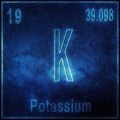A few years back, I wrote a paper about the anti-folate and anti-thiamine properties of a popular antibiotic called Bactrim. It is also sold under the trade names: Septra, Sulfatrim, Septrin, Apo-Sulfatrim, SMZ-TMP and cotrimoxazole. Bactrim is a formulation that combines two drugs, trimethoprim and sulfamethoxazole. Both drugs block folate, albeit via different mechanisms, but trimethoprim blocks thiamine too. The combination has a number of deleterious effects, not the least of which is the possibility for a drug-induced Wernicke’s encephalopathy.
Today, I would like take a closer look at the relationship between thiamine and folate status as it affects transporter activity. It turns out that there is a lot more to the story than simply the drug’s depletion of critical nutrients. There is an interaction at play that determines the potency of these drugs and the severity of the nutrient depletion. That is, the individual’s nutrient status before taking the drug, to a large extent, may determine its effects.
It makes sense, of course, that the individual’s nutrient status would affect drug response. Poor nutrient status in general would exacerbate any illness and increase the risk frank deficiency and drug-induced mitochondrial damage. Beyond these broad strokes, however, there wasn’t a clear mechanism that would account for why some people become so severely debilitated by certain drugs and while others do not.
With regard to anti-folate drugs, a study done over 20 years ago found that nutrient transporter trafficking and directionality may be related to thiamine status. A caveat, this was a cell culture study using murine cell lines, including leukemia cells, and extrapolation to vivo human, non-leukemia cells is necessary. More recent animal research involving the use of methotrexate in liver cancer demonstrates similar effects, although mechanisms are not discussed. High thiamine status reduces methotrexate uptake. Conversely, methotrexate induces thiamine and folate deficiency (here, here).
Returning to the cell study, thiamine concentrations before exposure to anti-folate drugs appears not only to determine how much of drug is taken up by the cell (low thiamine > more drug uptake) but also the degree to which folate and thiamine are depleted. In low thiamine states, the potency anti-folate drug like methotrexate, and I suspect other anti-folate drugs that were not tested, is magnitudes greater than with higher thiamine concentrations. What I found particularly interesting, was that this effect was mediated largely by changes in the folate transporter (RFC1), which controlled not only the influx of folates and anti-folate drugs, but also, the efflux of thiamine pyrophosphate (TPP), the activated form of thiamine. The researchers found that when thiamine was low, more drug was taken up by the cell, while more TPP was spit out of the cell, essentially causing an intracellular deficiency of both folate and thiamine. Of note, a less active form of thiamine, thiamine monophosphate (TMP), appeared to be trafficked into the cell in exchange of the more active TPP.
Since a good portion of the population is likely low in thiamine, this means the potential damage by these drugs is significant and under-recognized. Might some of the adverse effects associated with these medications be related to either folate and/or thiamine deficiency? Possibly, which means supplementation with these nutrients may help.
We Need Your Help
More people than ever are reading Hormones Matter, a testament to the need for independent voices in health and medicine. We are not funded and accept limited advertising. Unlike many health sites, we don’t force you to purchase a subscription. We believe health information should be open to all. If you read Hormones Matter, like it, please help support it. Contribute now.
Yes, I would like to support Hormones Matter.
Photo by Aaron Burden on Unsplash.















Hi, I’am supplementing with thiamine for 6 months now ( Im injections, benfo,ttfd, hcl) and b complex, magnesium, pottasium, extra b2 (100mg). My main and worst symptom is difficulty swalowing( like forgot how to swalow,need focus to initiate process), panic attacks, anxiety, fatigue,Gi problems. For first 3-4 months I was improving great, but now I started feel bad again.I get dry skin, dermatitis on hands and scrotum area, sensitive eys,dry lips and looks like thiamine not working anymore. Is it could be riboflavin deficiency? any advice? Thanks.
It could be a number of things. Without more detail it is difficult to tell. If you would like to write up your entire case story, pre- thiamine health and symptoms, during and current symptoms, along with all of the other details regarding what you are taking, diet, lifestyle, publish it on HM and then perhaps I can offer some insight. Others may as well. The story can be anonymous, if you would like.